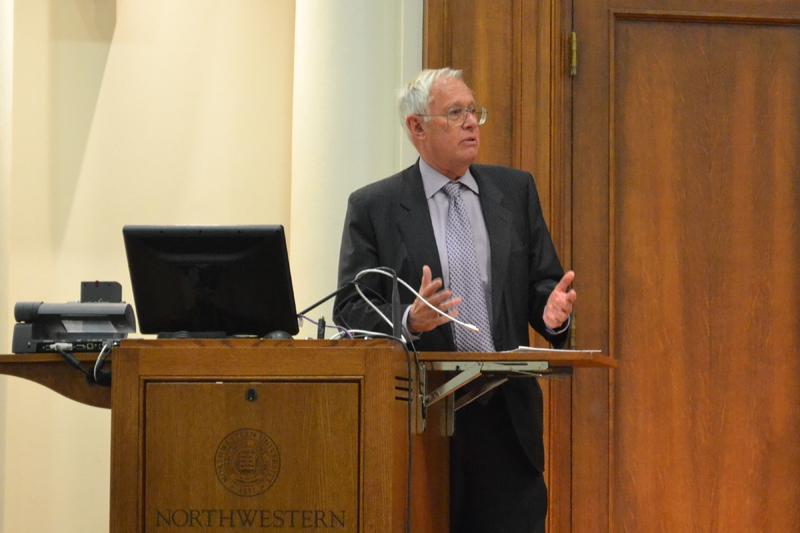Former president Henry Bienen discusses educational disparities at panel
Ebony Calloway/The Daily Northwestern
Former University President Henry Bienen introduces a panel Tuesday night at Harris Hall. Panelists discussed ways to improve education in marginalized communities.
October 23, 2013
In the affluent Chicago suburb of Winnetka, New Trier Township High School boasts an average ACT score of 27.5. On the city’s south side, students at the W.R. Harper High School average just 15 on the test.
These discrepancies were the starting point for a panel Tuesday night at Harris Hall featuring former University President Henry Bienen. The panelists at “Education in Our Communities” discussed education in Chicago’s most marginalized communities.
Bienen, who was appointed by Chicago Mayor Rahm Emanuel (Communication ’85) to the board of Chicago Public Schools, opened the event by describing the variety of challenges the board faces. The biggest obstacle, Bienen said, is funding, with an operating budget of about $5.5 billion to $5.8 billion and having to pay for pensions.
“Under law, we have to fund pensions of the school system,” he said. “We now have to put hundreds of millions of dollars a year into the pension system, and that comes out of all the other things we use the operating budget for.”
Panelist Tanesha Peeples, the state program director for Students For Education Reform, said the biggest difficulty she faces is empowering marginalized communities. She referenced panhandlers and teen mothers as groups that epitomize a broken system.
“It’s a very disappointing feeling because you know their lives are worth so much more, but because of the injustices and inequities that they face, they are unaware of their self worth and so they become complacent with terrible schools,” she said.
She added that people need to take accountability for the failed system.
“Everyone is pointing figures,” she said. “No one is taking into account the best interest of the students.”
Nisaini Rivera teaches at Chicago International Charter School, Lloyd Bond campus, where she is one of few non-black teachers or students.
“I really have to teach my kids how to think outside the box and how to not use being a person of color as a deficiency, but as a proficiency,” she said at the panel. “Racism, race and class — they matter. They matter when you’re nine, they matter when you’re 27. They’re always going to matter. I think that it is essential as an educator, if I want my kids to be social agents for change, they need to be able to fight with intellect and not the way the streets teach them to fight with their fists.”
Nisaini said one question comes to her mind when she thinks about her students: “How many of my boys will be the next Trayvon?”
The event was sponsored by Teach for America, Multicultural Greek Council, SFER, Associated Student Government and Supplies for Dreams. Therese Kaltenecker, president of SFD, said she appreciated the different perspectives of the panelists and the message of the importance of establishing a support network.
“I was lucky enough to have a great support network and attend a private school,” the McCormick junior said. “College was always an opportunity for me. I just want to provide that same support network for other students.”
Bienen concluded with a dose of reality about the board’s options moving forward.
“There is no magic wand,” he said. “There are just tough choices to make.”
Email: tylerpager2017@u.northwestern.edu
Twitter: @tylerpager



